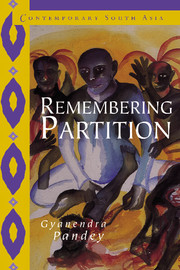Book contents
- Frontmatter
- Contents
- Acknowledgments
- List of abbreviations
- 1 By way of introduction
- 2 The three partitions of 1947
- 3 Historians' history
- 4 The evidence of the historian
- 5 Folding the local into the national: Garhmukhteshwar, November 1946
- 6 Folding the national into the local: Delhi 1947–1948
- 7 Disciplining difference
- 8 Constructing community
- Select bibliography
- Index
1 - By way of introduction
Published online by Cambridge University Press: 06 January 2010
- Frontmatter
- Contents
- Acknowledgments
- List of abbreviations
- 1 By way of introduction
- 2 The three partitions of 1947
- 3 Historians' history
- 4 The evidence of the historian
- 5 Folding the local into the national: Garhmukhteshwar, November 1946
- 6 Folding the national into the local: Delhi 1947–1948
- 7 Disciplining difference
- 8 Constructing community
- Select bibliography
- Index
Summary
Questions of violence, nationhood and history
This book focuses on a moment of rupture and genocidal violence, marking the termination of one regime and the inauguration of two new ones. It seeks to investigate what that moment of rupture, and the violent founding of new states claiming the legitimacy of nation-statehood, tells us about the procedures of nationhood, history and particular forms of sociality. More specifically, it attempts to analyse the moves that are made to nationalise populations, culture and history in the context of this claim to nation-statehood and the establishment of the nation-state. In the process, it reflects also on how the local comes to be folded into the national in new kinds of ways – and the national into the local – at critical junctures of this kind.
The moment of rupture that I am concerned with has been described as a partition, although it is more adequately designated the Partition and Independence of the Indian subcontinent in 1947. As a partition, it shares something with the political outcomes that accompanied decolonisation in a number of other countries in the twentieth century: Ireland, Cyprus, Palestine, Korea, Vietnam and so on. Orientalist constructions, and ruling-class interests and calculations, through the era of formal colonialism and that of the Cold War, contributed fundamentally to all of these. In addition, it may be that the liberal state has never been comfortable with plural societies where communities of various kinds continue to have a robust presence in public life alongside the post-Smithian economic individual: perhaps that is why the combination of such mixed societies with the demands of colonialism – and of decolonisation – has often been lethal.
- Type
- Chapter
- Information
- Remembering PartitionViolence, Nationalism and History in India, pp. 1 - 20Publisher: Cambridge University PressPrint publication year: 2001



